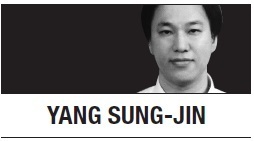Nexon, the country’s biggest game company, is drawing mixed reactions from local media and technology pundits after it attempted to broaden its influence on NCSoft, a leading game developer.

Nexon initially held a benign position concerning its purchase of a stake in NCSoft, known for a series of hit online games including the “Lineage” franchise. A strategic alliance for the common good of the Korean gaming industry was a good nominal cause to pursue for both companies.
But Nexon has changed its mind and is now trying to exercise some rights over the management of NCSoft as the largest shareholder, with a stake of over 15 percent.
What has happened? Before analyzing the underlying reasons, however, it should be noted that Nexon is a very clever company. How clever? Just look at its official corporate profile. It was founded by South Korean gaming pioneer Kim Jung-ju in 1994, but its global headquarters is in Tokyo, Japan ― not Seoul, South Korea. Nexon is also listed on the Tokyo Stock Exchange, and it is often described as a “Japanese company” by foreign media.
Of course, its holding company NXC, based on Jejudo Island, controls the Japanese headquarters and, by extension, other subsidiaries including the Korean unit. Therefore, those who pay attention to Nexon are fully aware that it is basically a Korean company and yet its corporate structure is not based in Korea for various reasons.
Japan, in all fairness, is a far bigger market when it comes to technology and gaming industries than Korea. Even though Korean policymakers boast Korea has solid mobile and broadband infrastructure, it is difficult to say that Korea is truly an IT powerhouse. Except for the top-notch mobile and broadband networks, Korea is lagging behind other advanced countries in terms of technology-related regulations and policies.
The gaming industry is a case in point. Gaming is, at least in the eyes of Korean policymakers and parents, a sort of addictive, good-for-nothing activity that is closer to gambling, smoking or other social vices.
A number of regulatory restrictions have been imposed on the operations of game developers and publishers. This backward environment for gamers and game developers is unlikely to change soon, even though President Park Geun-hye has been keen to make deregulation her shining legacy.
While Korean game developers have long been stuck with the stubbornly strong regulations in the domestic market, two important trends are reshaping the entire gaming industry. First, PC-based games have been deemed largely outdated and cumbersome because the majority of gamers have already shifted to mobile games, which can be played on smartphones. Second, foreign competitors, notably Chinese rivals, are making rapid inroads into the Korean gaming market.
The first change ― the demise of the PC as the default gaming platform ― is forcing Korean developers to rethink their survival strategies. NCSoft, for instance, used to rule the PC-based gaming industry here with its highly addictive massively multiplayer online role-playing games. But a growing number of people are opting for mobile games and this shift is likely to accelerate in the coming years, posing a threat to most PC game developers. This is why NCSoft belatedly unveiled a new mobile-based strategy last year.
The second change ― the popularity of foreign games ― is visible in the weekly rankings of PC-based games in Korea. “League of Legends,” a free-to-play game developed by Riot Games, has long been the undisputed No. 1 game in Korea, with a share of nearly 38 percent. NCSoft games, meanwhile, is struggling to compete against the dominant LOL. NCSoft’s once-glorious “Lineage” has a share of less than 3 percent, while another flagship title, “Blade & Soul,” is trailing behind with a share of less than 2 percent.
Other titles developed or published by Korean companies are similarly being sidelined while LOL is virtually monopolizing the PC-based gaming market here. Chinese developers are also scrambling to expand their share in the potentially lucrative Korean market, another headache for Korean game companies, which are trying to retain their talented developers.
The combination of the two threats is serious enough to warrant extra measures on the part of Korean game developers, and, against this backdrop, Nexon’s official excuse behind its unusually aggressive move toward NCSoft ― the “rapidly changing IT industry” ― does not seem so outrageous.
Something should be done about the lethargic local gaming industry; if not, even the powerhouses such as NCSoft might lose their grip on the market. It remains to be seen, however, whether Nexon’s bold move is the right answer to the conundrum for the Korean gaming industry.
By Yang Sung-jin
Yang Sung-jin is the digital content desk editor of The Korea Herald. He can be reached at insight@heraldcorp.com. ― Ed.








![[Today’s K-pop] Blackpink’s Jennie, Lisa invited to Coachella as solo acts](http://res.heraldm.com/phpwas/restmb_idxmake.php?idx=644&simg=/content/image/2024/11/21/20241121050099_0.jpg)